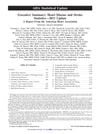
Search
for
Sort by
Research
390-420 / 807 results

research The Clinical Evaluation of Hirsutism
Hirsutism is excessive hair growth in women often caused by polycystic ovarian syndrome, and identifying the cause is important for managing associated health risks.

research The Role of Micronutrients in Alopecia Areata: A Review
People with alopecia areata often have lower levels of vitamin D, zinc, and folate, but more research is needed to understand if supplements can help treat it.

research How Should Postmenopausal Androgen Excess Be Evaluated?
Evaluate postmenopausal women with high androgen levels using medical history, physical exams, lab tests, and imaging to manage health risks.

research Phenotypic Profiling of Parents With Cryptic Nonclassic Congenital Adrenal Hyperplasia: Findings in 145 Unrelated Families
Some parents have a mild form of congenital adrenal hyperplasia without symptoms, and they usually don't need treatment.

research Autoimmune Polyglandular Syndrome Type 1 in Russian Patients: Clinical Variants and Autoimmune Regulator Mutations
Genetic screening is crucial for accurately diagnosing APS-1 due to its varied symptoms.

research Ovarian Hypertension: Polycystic Ovary Syndrome
Polycystic Ovary Syndrome is linked to higher risk of hypertension and heart disease.

research Polycystic Ovary Syndrome and Insulin-Resistant Hyperinsulinemia
Insulin resistance contributes to hormone imbalances in many women with polycystic ovary syndrome.

research Association of Surgical Risk With Exogenous Hormone Use in Transgender Patients
Hormone treatment for transgender patients may not need to be stopped before surgery, but more research is needed, especially on estrogen.

research Cutaneous and Mucosal Manifestations Associated with Celiac Disease
Celiac disease can cause skin problems that may get better with a gluten-free diet.

research Rethinking Biotin Therapy for Hair, Nail, and Skin Disorders
Biotin supplements are not proven to improve hair or nails and may interfere with medical tests.

research Skin Manifestations in Primary Immunodeficient Children
Nearly half of children with primary immunodeficiency disorders showed skin problems, often as the first sign of their condition.

research Clinical Management of Patients with ASXL1 Mutations and Bohring-Opitz Syndrome, Emphasizing the Need for Wilms Tumor Surveillance
Patients with Bohring-Opitz syndrome and ASXL1 mutations need regular kidney ultrasounds to check for tumors.

research Zinc Deficiency Associated with Hypothyroidism: An Overlooked Cause of Severe Alopecia
Zinc supplements may be needed to treat hair loss in hypothyroidism.

research SARS-CoV-2-Induced Telogen Effluvium: A Multicentric Study
COVID-19 infection may cause significant hair loss, but full hair recovery is likely without special treatment.

research Polycystic Ovary Syndrome: Early Detection in Adolescents
Early detection and treatment of PCOS in teenagers is important to manage symptoms and prevent severe issues.

research Executive Summary: Heart Disease and Stroke Statistics—2011 Update
Cardiovascular disease deaths decreased but still caused one-third of U.S. deaths in 2007, with high rates of hypertension, smoking, obesity, and diabetes.

research The Impact of SARS-CoV-2 and COVID-19 on Male Reproduction and Men's Health
COVID-19 might affect male fertility, but more research is needed to understand the full impact.

research A Comparison of the Hormonal Profile of Early Androgenetic Alopecia in Men With the Phenotypic Equivalent of Polycystic Ovarian Syndrome in Women
Men with early hair loss have similar hormone levels to women with PCOS, possibly increasing risk of obesity and heart issues.

research Physiopathology and Current Treatments of Androgenetic Alopecia: Going Beyond Androgens and Anti-Androgens
Hair loss treatments work better with lifestyle changes.

research Ultrasonographic and Laboratory Markers of Metabolic and Cardiovascular Disease Risk in Obese Women with Polycystic Ovary Syndrome
Obese women with PCOS are more likely to have fatty liver disease.

research Lipid Levels in Patients with Lichen Planus: A Case-Control Study
People with lichen planus have higher bad cholesterol and lower good cholesterol, increasing their risk for heart disease.

research Serum Levels of Retinol-Binding Protein 4 and Adiponectin in Women with Polycystic Ovary Syndrome: Associations with Visceral Fat but No Evidence for Fat Mass-Independent Effects on Pathogenesis in This Condition
Women with PCOS have similar levels of certain proteins compared to women without PCOS, and these proteins don't independently cause PCOS.

research Curtailing Polycystic Ovary Syndrome: A Review of International Evidence-Based Guidelines and Implications
Lifestyle changes are the main treatment for PCOS, which is a complex condition requiring early management to reduce its health impacts.

research Nudging Hair Shedding by Antidandruff Shampoos: A Comparison of 1% Ketoconazole, 1% Piroctone Olamine, and 1% Zinc Pyrithione Formulations
All three shampoos reduced dandruff and hair loss, but ketoconazole and piroctone olamine also made hair thicker.

research Toward a Diagnostic Score in Cushing's Syndrome
The document suggests creating a validated score to diagnose Cushing's Syndrome and considers plasma steroid profiling as a simpler diagnostic method.

research Mood Disorders and Quality of Life in Polycystic Ovary Syndrome
Women with PCOS often have mood disorders and a lower quality of life, and treatment should focus on both physical and mental health.

research Advances in the Management of Cutaneous Toxicities of Targeted Therapies
Targeted cancer therapies often cause skin problems that need careful management to improve patient quality of life and treatment success.

research Polycystic Ovary Syndrome and Its Differential Diagnosis
The document concludes that correct diagnosis and management of PCOS are important, and more research is needed on its risks and treatments.

research Systemic Treatments for Alopecia Areata: A Systematic Review
No systemic treatment for alopecia areata has strong evidence of effectiveness.